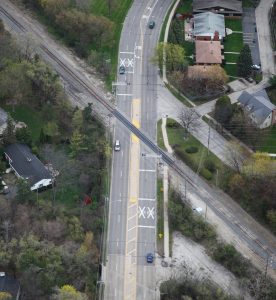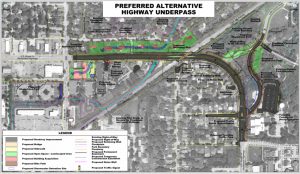Barrington moves ahead with train underpass
Gregory Harutunion for Chronicle Media — September 6, 2016
The Canadian National railroad crossing in Barrington, as it is currently configured, will receive a trenched underpass to relieve traffic congestion and leave one road open, during train passages.
Barrington is awaiting state approval to implement completion of a Phase II plan to acquire the necessary properties, and move forward with an ambitious slate to relieve traffic congestion, due to freight trains moving through the city and blocking major thoroughfares at four railroad crossings.
Phase I encompassing design engineering is finished, and was borne from a January 2014 public hearing, attended by nearly 500 people to learn about the options at the fourth such convened session. The favored proposal involves a trenched underpass on Route 14, and the relocation of Lake Zurich Road to a traffic signal at Berry Road.
“The relocation is underway now, with the final objective being at least one roadway open at all times, and free from trains blocking the path,” said Greg Summers, the village’s director of development services. “When it happens, it cuts off the town. The closest hospital is on one side, and the public safety and fire departments on the other side.
“This creates a serious issue in emergency situations. With one route always open, we can keep traffic moving, and Route 14 is also where the police and fire stations are located,” he said. “It’s also a four-lane road in Barrington. To maintain perspective, one train can be 10,000 feet, or longer … effectively, one train can block all four crossings.”

A plat map shows the planned improvements slated for Route 14 in Barrington, which includes the relocation of Lake Zurich Road to meet with Berry Road.
The Lake Zurich Road relocation project is fully funded at $5.4 million, and the village’s contribution is expected to cost $348,700. The cost breakdown assesses 80 percent of the money from the U.S. Surface Transportation Program, 10 percent coming from the state of Illinois, and the remaining 10 percent from the village itself.
“We’re waiting for the state to approve the plan for land acquisition along the road relocation plat, and when that comes through, we can begin contacting property owners to obtain the parcels,” said Summers.
Taxpayer funding for the relocation is also the subject of an advisory referendum question set to appear on the Nov. 8 election ballot. Residents Peter and Deborah Cotopolis, who live near the proposed underpass, filed petitions with nearly 600 signatures of registered voters with the Lake and Cook county clerk’s offices. Barrington is in both counties, and the referendum question is non-binding.
The plan had its origins in 2010, and the Illinois Department of Transportation has committed $4 million toward the underpass project for the land acquisition proper. The overall cost of the land purchases near the right of way, the Lake Zurich Road relocation, and the underpass construction are tabbed at an estimated $62 million.
When the federal government allowed the Canadian National Railway to purchase and lease track lines within its borders, the concept was to present an alternative routing system for the commodity carrier. Opponents argued that the increased train flux through numerous smaller cities and county locations would instigate vehicle traffic delays on roads with crossings.
“That has happened and Barrington has four CN crossings within a distance of 5,918 feet,” Summers said. “As I indicated, one train can be 10,000 feet, or longer. This process, for the project, has gone through public hearings for input that we’ve taken directly into account. The Citizens Advisory Group is comprised of 21 members including the fire and police chiefs, library district personnel, and homeowners.”
Federal officials have rejected three previous requests to mandate payment from Canadian National as compensation for causing the recurrent traffic delays.
“We’ve experienced a few train breakdowns blocking the crossings, one was on a Friday, during rush hour,” said Summers.
Similar projects in Lake County have deferred to CN trains and are being constructed under the premise of relieving vehicle traffic congestion at roadway crossings. The recently completed Rollins Road underpass in Round Lake has been successful in skirting train delays but the gridlock remains, during normal and peak hours. A total of 6 traffic signals, including one at Route 83, operate within a distance of 1.2 miles, from N. Orchard Lane to Hook Drive.
In addition, Lake County’s division of transportation has announced the closure of Washington Street, west of Lake Street in Grayslake, to facilitate another underpass project which began in 2015. The closure dates are Sept. 9-12. The stretch of road, from east of the Metra station entrance to Lake Street, will be completely inaccessible during the three-day period.
“I don’t have enough knowledge of those projects to contrast and compare those projects with the village project,” said Summers. “We are now working on land acquisition and moving forward.”



